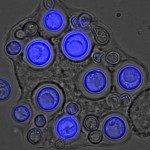Link to Pubmed [PMID] – 17468115
J Antimicrob Chemother 2007 Jun; 59(6): 1076-83
A patient with Candida albicans thrush and oesophagitis was treated with high doses of caspofungin but treatment eventually failed. Four C. albicans isolates were serially recovered before and after caspofungin treatment. A microbiological study was performed to characterize these four isolates.In vitro antifungal susceptibility testing was performed by the EUCAST reference method in RPMI and AM3 and by Etest. Molecular typing of the four isolates was done by sizing three polymorphic microsatellite markers. To look for specific mutations, sequencing of a region of the gene encoding the 1-3-beta-D-glucan synthase was performed for the four isolates.In vitro antifungal susceptibility testing showed an increase in both caspofungin and micafungin MICs for the two isolates recovered after caspofungin treatment failure. The best discrimination between the pre-treatment and post-treatment isolates was obtained with Etest. Molecular typing of the four isolates showed that the post-treatment isolates with reduced susceptibility were identical to a susceptible pre-treatment isolate, suggesting the acquisition of caspofungin resistance. Sequencing of the gene encoding the 1-3-beta-D-glucan synthase showed a mutation responsible for an amino acid change at Phe-641 that could confer reduced susceptibility to both echinocandins.Our results indicate that is it useful to perform in vitro susceptibility testing in the cases of clinical failure during caspofungin therapy.

